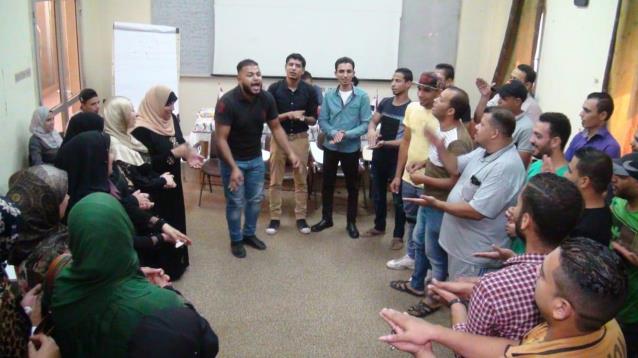Egyptian Men Stand Up for Gender Equality—In homes and on the streets
Date:

Egypt faces profound gender inequalities, including harassment and gender-based violence. In five of Egypt’s governorates, the UN Women “Men and Women for Gender Equality” regional programme, in partnership with CARE International and Sida, is working with local communities and authorities to address the attitudes that lead to violence against women in all its forms.
Mariam Ezzat Nathan, a senior field supervisor at CARE International in Egypt, spoke to UN Women about activities implemented on the ground within the framework of the programme to tackle issues such as female genital mutilation and harassment.
“We began to work with UN Women at the end of 2015, to conduct capacity building for 15 CBOs [community-based organizations]. The local organizations we selected work in the governorates of Cairo, Alexandria, Al Qalyubyia, Sohag, and Asyut,” ranging from Cairo’s urbanized north to remote rural south.
The aim of this training was to support the capacity of these 15 organizations to foster positive relationships between men and women in the communities where the CBOs are based. For example, these organizations were holding later on community discussions with a focus on tackling the issue of violence against women.
Through 12 training sessions and 4 workshop discussions, Mariam said, facilitators detailed the broader impact of violence against women, particularly in the home setting. “During our trainings with men and women, we make clear to them the negative effects of domestic violence against women on those around them, namely their children.” she explained. These negative effects can include not only physical harm but also psychological damage, for example impacting on women's self-confidence, creating sense of unhealthy dependence on spouse, feelings of frustration and depression, humiliation and loss of a sense of initiative and autonomous decision-making. On a social level, effects can include isolation of the woman from family and friends, disintegration of the family unit, and children withdrawing from education or displaying aggressive behaviour.
“In Asyut and Sohag [in southern Egypt], we work to engage grandmothers, because these are the ones who often encourage early marriage. We convince them that girls must study, that it’s their right. We explain to them the impact of violence on the girls which they’ll likely face should they be married early.”
Another form of violence against women is street harassment, an extremely common occurrence for which the coalition is enlisting men to fight against.
Integrating men into addressing gender equality is critical, Mariam noted. One group of men the coalition targets are drivers of tuk-tuks, three-wheeled vehicles used as taxis.
“There’s a stereotype that tuk-tuk drivers steal and sell drugs. We work with them to dispel this image, and at the same time ask them to stand up to the harassment of women that they witness during their work—not only as a moral cause but because fighting harassment will also bring them a better income at the end of the day. If you’re harassing women, of course then women won’t want to ride with you.”
Mariam added that, in addition to the economic arguments, “we lead [the drivers] through the entire awareness-raising process. Then we integrate the men into our activities, namely art therapy–such as songs and sculptures and theatre—where we work with them to express their ideas of personal boundaries for themselves and others, gender equality, and domestic violence.”
Mariam noted with pride that one of the male tuk-tuk drivers the coalition trained in Qalyubiya, named Hamza, conducted an informal study of his tuk-tuk route, identifying the exact locations where he observed the most harassment against women and calculating the average number of incidents of harassment in each spot per day.
He then organized groups of five to six men that went to each of the high-occurrence harassment locations and spoke to the tuk-tuk drivers in that area, engaging in the same awareness-raising discussions against harassment which the coalition had presented to him. They recorded the drivers’ feedback to map their progress and document changing attitudes. Most of the drivers joined efforts and the group has now grown to a membership of dozens of advocates all spreading messages against harassment.